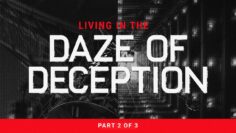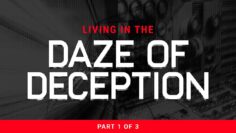
Why Should We Trust the Gospel Writers?
In this video, I share a few key reasons to believe the Gospel writers care about truth. This does not solely prove what they wrote is true, but it helps establish their sincerity and honesty.
READ: Evidence that Demands A Verdict (https://amzn.to/3fuJsw1)
SUBSCRIBE TO THE CHANNEL:
https://www.youtube.com/user/Seanmcdo…
*Get a MASTERS IN APOLOGETICS or SCIENCE AND RELIGION at BIOLA (https://bit.ly/3LdNqKf)
*USE Discount Code [SMDCERTDISC] for $100 off the BIOLA APOLOGETICS CERTIFICATE program (https://bit.ly/3AzfPFM)
*See our fully online UNDERGRAD DEGREE in Bible, Theology, and Apologetics: (https://bit.ly/448STKK)
FOLLOW ME ON SOCIAL MEDIA:
Twitter: https://twitter.com/Sean_McDowell
TikTok: @sean_mcdowell
Instagram: https://www.instagram.com/seanmcdowell/
source











Very good. Wish this had more views!
Gospel authors were disingenuous people who were willing to change history just to suit their narrative of Jesus. Here are few examples of this:
1. Jesus and the question of eternal life
In Mark’s account, Jesus rejects the questioner’s praise of him being good.
As Jesus started on his way, a man ran up to him and fell on his knees before him. “Good teacher,” he asked, “what must I do to inherit eternal life?” “Why do you call me good?” Jesus answered. “No one is good—except God alone.” [Mark 10:17-18]
Contrast this with Matthew’s account which subtly re-phrases Jesus’ response:
Just then a man came up to Jesus and asked, “Teacher, what good thing must I do to get eternal life?” “Why do you ask me about what is good?” Jesus replied. “There is only One who is good. If you want to enter life, keep the commandments.” [Matthew 19:16-17]
Matthew’s author seems to have been troubled by the implication of the question “Why do you call me good?” and therefore re-phrased it (very slightly) in such a way as to change the question and avoid the difficult implication that Jesus might be admitting to not being wholly ‘good’.
2. Death of Jesus – inside or outside Jerusalem?
In the Gospel of Mark, Jesus relates a parable about himself which points to his death inside a vineyard:
He then began to speak to them in parables: "A man planted a vineyard. He put a wall around it, dug a pit for the winepress and built a watchtower. Then he rented the vineyard to some farmers and went away on a journey. At harvest time he sent a servant to the tenants to collect from them some of the fruit of the vineyard. But they seized him, beat him and sent him away empty-handed. Then he sent another servant to them; they struck this man on the head and treated him shamefully. He sent still another, and that one they killed. He sent many others; some of them they beat, others they killed. "He had one left to send, a son, whom he loved. He sent him last of all, saying, `They will respect my son.' "But the tenants said to one another, `This is the heir. Come, let's kill him, and the inheritance will be ours.' So they took him and killed him, and threw him out of the vineyard. [Mark 12:1-8]
The same parable can be found in Matthew and Luke, however, their accounts have Jesus being killed outside a vineyard:
So they took him and threw him out of the vineyard and killed him. [Matthew 21:39]
So they threw him out of the vineyard and killed him. "What then will the owner of the vineyard do to them? [Luke 20:15]
In this parable, vineyard symbolizes the city of Jerusalem. In other words, Mark have Jesus die inside Jerusalem whereas Matthew and Luke have Jesus die outside Jerusalem.
The reason why Matthew and Luke change the location of Jesus' death from inside to outside Jerusalem is because it is against the Law of Moses to punish someone inside the camp:
Then the LORD said to Moses, "The man must die. The whole assembly must stone him outside the camp." So the assembly took him outside the camp and stoned him to death, as the LORD commanded Moses. [Numbers 15:35-36]
That is why in the book of Acts we read that Jews dragged Stephen outside the city to stone him:
At this they covered their ears and, yelling at the top of their voices, they all rushed at him, dragged him out of the city and began to stone him. Meanwhile, the witnesses laid their clothes at the feet of a young man named Saul. [Acts 7:57-58]
New American Bible Revised Edition (NABRE) confirms this:
Luke has altered his Marcan source and reports that the murder of the son takes place outside the vineyard to reflect the tradition of Jesus’ death outside the walls of the city of Jerusalem
You can view it online here:
https://www.biblegateway.com/passage/?search=Luke%2020%3A15&version=NABRE
So does Biblical scholar Raymond Brown:
Matthew inverts the order of events to fit the view that Jesus died outside the city.
– The New Jerome Biblical commentary pp. 665
The tradition of Jesus dying outside Jerusalem can be found in several places of the New Testament.
For example, Gospel of John states that the place where Jesus was crucified was near the city:
Many of the Jews read this sign, for the place where Jesus was crucified was near the city, and the sign was written in Aramaic, Latin and Greek. [John 19:20]
Book of Hebrews also confirms that Jesus was crucified outside the city gate:
The high priest carries the blood of animals into the Most Holy Place as a sin offering, but the bodies are burned outside the camp. And so Jesus also suffered outside the city gate to make the people holy through his own blood. Let us, then, go to him outside the camp, bearing the disgrace he bore. For here we do not have an enduring city, but we are looking for the city that is to come [Hebrews 13:11-14]
Now this is not the only contradiction that is present. In the following account, Luke claims that Jesus foretold that it is impossible for him to die outside Jerusalem:
In any case, I must keep going today and tomorrow and the next day–for surely no prophet can die outside Jerusalem! [Luke 13:33]
We can see that Luke's parable not only contradicts Mark about the location of Jesus' death but Luke also contradict itself when it claims that Jesus foretold that he cannot die outside Jerusalem.
3. Date of the Crucifixion
According to the Gospels of Mark, Matthew and Luke, the Last Supper is the Passover meal which Jesus ate with his disciples:
The disciples left, went into the city and found things just as Jesus had told them. So they prepared the Passover. When evening came, Jesus arrived with the Twelve. While they were reclining at the table eating, he said, “Truly I tell you, one of you will betray me—one who is eating with me.”
[Mark 14:16-18]
So the disciples did as Jesus had directed them and prepared the Passover. When evening came, Jesus was reclining at the table with the Twelve. And while they were eating, he said, “Truly I tell you, one of you will betray me.”
[Matthew 26:19-21]
They left and found things just as Jesus had told them. So they prepared the Passover. When the hour came, Jesus and his apostles reclined at the table. And he said to them, “I have eagerly desired to eat this Passover with you before I suffer. [Luke 22:13-15]
Now, John also indicates that Jesus had a last meal with his disciples. But, oddly, we’re told his final meal took place before the festival of Passover:
“It was just before the Passover Festival. Jesus knew that the hour had come for him to leave this world and go to the Father. Having loved his own who were in the world, he loved them to the end. The evening meal was in progress…” [John 13:1-2]
John also says that, as the Last Supper was getting started, Jesus sent Judas Iscariot away:
Then after he had taken the morsel, Satan entered into him. Jesus said to him, “What you are going to do, do quickly.” Now no one at the table knew why he said this to him. Some thought that, because Judas had the moneybag, Jesus was telling him, “Buy what we need for the feast,” or that he should give something to the poor. So, after receiving the morsel of bread, he immediately went out. And it was night. [John 13:27-30]
This indicates that the group did not yet have what they needed for the Passover feast, which would mean the feast was yet to come.
Further evidence for this is provided by John 18:28, where Jesus’ accusers were delivering him to Pilate:
Then they led Jesus from the house of Caiaphas to the governor’s headquarters. It was early morning. They themselves did not enter the governor’s headquarters, so that they would not be defiled, but could eat the Passover.
Finally, John explicitly states that Jesus was crucified on the day of Preparation for the Passover:
Now it was the day of Preparation of the Passover. It was about the sixth hour. He said to the Jews, “Behold your King!” They cried out, “Away with him, away with him, crucify him!” Pilate said to them, “Shall I crucify your King?” The chief priests answered, “We have no king but Caesar.” [John 19:14-15]
Remember that in the Synoptic Gospels, Jesus actually eats the Passover with his disciples before his arrest. John’s timing of the story is different.
Why did John alter the story? We find a clue in John’s writings when he refers to Jesus as the “Lamb of God”:
The next day John saw Jesus coming toward him and said, “Look, the Lamb of God, who takes away the sin of the world!” [John 1:29]
It’s crucial to note that John is the only Gospel that identifies Jesus as the “Lamb of God”.
John’s Gospel thus portrays Jesus as the Passover lamb, slaughtered on the day of Preparation of Passover, whose shed blood somehow brings salvation, just as the blood of the Passover lamb brought salvation to the children of Israel so many centuries before.
In other words, John has told a story that is not historically accurate, but is, in his judgement, theologically true.
Thus we can see that the Gospel of John is not writing about the historical Jesus. John alters the day of the Crucifixion to portray Jesus as the Passover lamb, he alters the story to make a theological point.
I guess technically it was Jesus who first discovered the tomb empty lol
Thank you, I really needed to hear that
Shame on you!
Sean,
@7:47 you said that Peter called Jesus
Satan but you had it written correctly on the screen. This happens quite often to many presenters. Just wanted to call your attention on this.
I like your presentation.
Can you address racial prejudice in the church and how it creates disunity? How Satan segregates churches on Sunday morning by getting people to create cliques and conversation to exclude people based skin color and culture and not addressing this as sin that needs to be repented for?
The verse sited to proclaim that Peter called Jesus, Satan… (Matthew 16:23) is not accurate. Peter did not call Jesus, Satan. Actually, it was just the opposite; Jesus said to Peter: “Get behind me Satan”. Peter was rebuking Jesus because Jesus was telling them about the suffering and death He would endure. I do not know if this inaccurate statement in the video was deliberate or by mistake.
No. The gospels are all anonymous and written 40 to 80 years after the supposed resurrection. The Mark gospel was the first written and the Mathew and Luke authors got hold of copies of the Mark gospel and used it as a basis for their own works, changing or deleting what they didn't like. 90% of Mark repeats in Mathew. 50% of Mark repeats in Luke. We know that Matthew wasn't written by an apostle Matthew because he's referred to in the 3rd person in the gospel. And if Matthew was an apostle, why copy so heavily from Mark, a non-apostle? Luke is supposedly a Greek physician friend of Paul's. But Greek doctors practiced Hippocratic medicine and Hippocratic doctors never blamed any illness on demon possession. But the Luke author does several times. The John gospel is obviously a work of several authors. The gospels are religious fiction, written not to record history but, as the John author says, "So that you may believe."
We can't stop telling bcoz we fear God more than men.
10:52 Conveys the FALSE IMPRESSION that these "tall tales" are actual history he has a perfunctory disclaimer but then implies we know that these people died BECAUSE OF PREACHING JESUS. We know no such thing! Apologetic prevarication like this is what caused me to leave Christianity.
9:49 The "women at the tomb" is not what Paul said in 1 Cor:15 "4 that he was buried, that he was raised on the third day according to the Scriptures, 5 and that he appeared to Cephas,[b] and then to the Twelve. " What about the "women"?
7:52 What evidence (besides speculation) do we have that Peter calling Jesus Satan was embarrassing to "Matthew"?
7:35 What evidence do we have that "Peter denying Jesus" was embarrassing to "Mark" ?
5:43 People make up stories all the time for entertainment, for money, for power, for sex, to pass time….. This bifurcation of choices is very common in Christian apologetics: "Its either this or this ." and of course they say it is whatever supports their current ideas.
5:33 The criterion of embarrassment is stupid. It relies on who would be embarrassed about what and what the intention of the author who was writing any particular passage. As one scholar stated: "there actually is no evidence that anything originating in any Gospel was embarrassing to the author of that Gospel." Richard Carrier
3:00 The author of 1 John does not identify himself as an apostle, disciple or by name. It was not written by an ignorant Galilean fisherman!
2:10 2 Peter is a forgery not written by the "apostle Peter" who probably could not write.
"Luke was a doctor" 1:10 – Church tradition. We don't know squat about "Luke"!
I would not be so sure. Check the discussion on EF dawah channel.
It's happening right now.
What about the editors and redactors and scribes?
Great work Sean!
I like how you focus yourself on biblical accuracy and its history! :]
Hey Sean, in your dialogue with Paul, you mentioned that within 60 years of Jesus there'd still be about 1000(?) people who were eyewitnesses of Jesus' life, and X thousand within 30 years.
I've heard this before, who/where does this data stem from?
Thanks
Can’t wait to see all of the qualified peer reviewed YouTube atheists to “debunk” this video. 🙄
Greetings from Greece 😀